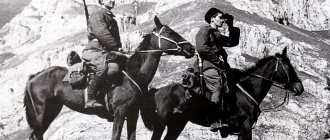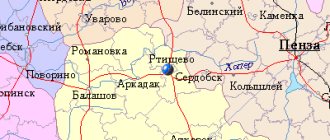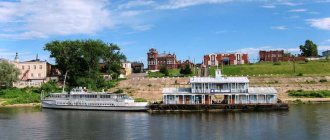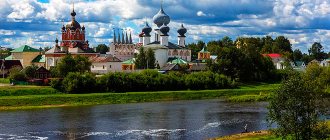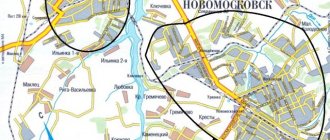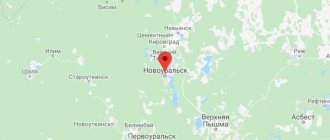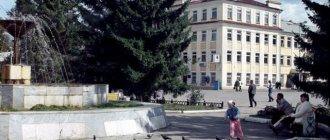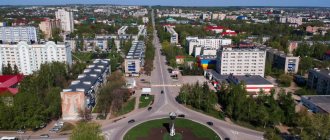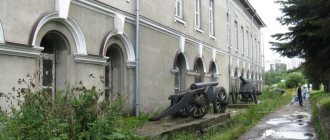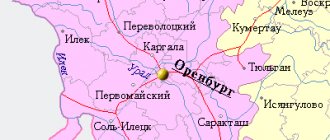This term has other meanings, see Belebey (meanings).
| City Belebey bashk. Balebay Flag | Coat of arms |
| A country | Russia, Russia |
| Subject of the federation | BashkortostanBashkortostan |
| Municipal district | Belebeevsky |
| urban settlement | Belebey city |
| Coordinates | 54°06′00″ n. w. 54°08′00″ E. d. / 54.10000° n. w. 54.13333° E. d. / 54.10000; 54.13333 (G) [www.openstreetmap.org/?mlat=54.10000&mlon=54.13333&zoom=12 (O)] (Z)Coordinates: 54°06′00″ N. w. 54°08′00″ E. d. / 54.10000° n. w. 54.13333° E. d. / 54.10000; 54.13333 (G) [www.openstreetmap.org/?mlat=54.10000&mlon=54.13333&zoom=12 (O)] (I) |
| Leaders of the urban settlement | Chairman of Belebeevsky City Council Nikolaev Nikolay Mikhailovich Head of the Belebey city administration Sakhabiev Azat Alvertovich |
| Based | in 1757 |
| First mention | 1757 |
| City with | 1781 |
| Square | 34.26 km² |
| Center height | 300 |
| Official language | Russian, Bashkir |
| Population | ↘59,204[1] people (2016) |
| Density | 1728.08 people/km² |
| National composition | Russians, Tatars, Chuvashs, Bashkirs, Ukrainians, Mordovians |
| Confessional composition | Orthodox, Sunni Muslims |
| Names of residents | belebeevtsy, belebeevets, belebeevka |
| Timezone | UTC+5 |
| Telephone code | +7 34786 |
| Postcode | 452000 |
| Vehicle code | 02, 102 |
| OKATO code | [classif.spb.ru/classificators/view/okt.php?st=A&kr=1&kod=80405 80 405] |
| Official site | [www.belebey-mr.ru/ ebey-mr.ru] |
| Awards | |
| Unofficial motto | “My head doesn’t hurt - Belebey is our Aibolit” |
| Belebey Moscow |
| Ufa Belebey |
Audio, photo and video
on Wikimedia Commons
K: Settlements founded in 1757
Belebey
(Bashk. Bәlәbәy (inf.)) is an urban settlement in the Republic of Bashkortostan of the Russian Federation, it is part of the Belebeevsky district, at the same time being its administrative center.
By Order of the Government of the Russian Federation dated July 29, 2014 No. 1398-r “On approval of the list of single-industry towns,” the urban settlement of Belebey is included in the category “Single-industry municipalities of the Russian Federation (single-industry towns) with the most difficult socio-economic situation”[2].
Geography
The city is located in the Southern Urals, in the center of Eurasia, on the Bugulma-Belebeevskaya Upland. Adjacent to the west are the eastern limits of the Russian Plain, called the High Trans-Volga region or the Urals. Belebey is intersected by the parallel 54 degrees 02 minutes north latitude and the meridian 54 degrees 01 minutes east longitude. It is located at an altitude of 379.6 meters above sea level.
The city is located near the Useni River (Kama basin), 180 km from Ufa.
Where can I find support?
When I left Belebey, the city was already falling asleep, but there was a golden, curly cloud high in the sky, and it seemed that it was illuminating the earth in place of the solar disk that had long disappeared behind the horizon.
General impression? Complex. But the situation in the city is not easy. A society without a backbone of authority is somewhat like a sponge, capable of absorbing everything.
When everything is shaky and unstable, people look for some kind of reliable support. They turn to religion, beliefs flourish, including such uncharacteristic ones for our region as Buddhism. The greater the tension of passions, the stronger the desire for inner silence. Old Believers are planning to build a church in Usen-Ivanovsky. Jehovah's Witnesses have revived.
There are two mosques in Belebey: old people go to the old one, and young people go to the new one. They say they have been arguing a lot lately. There are very disturbing facts. Among the most famous is the arrest by special forces of Belebey resident Vladimir Turaev, who headed the military wing of a religious extremist group subordinate to a native of Ingushetia, Bashir Pliev, known in the North Caucasus as the “Bashkir emir.”
Distrust of official information leads to the fact that rumors occupy an increasing place in the mass consciousness. They can also be mistaken for eccentricities, but they are rather an alarming symptom. What exactly? It's too early to say. The situation does not need to be dramatized, it needs to be understood.
The illusions are long gone; everything is filled with fatigue from long expectations. We need real, tangible success, but so far there is no reason for optimism.
Now, in the summer, there is a natural decline in activity. “Only the very lazy cannot find a job at this time of year,” says Magdan Sadrtdinov, director of the Belebey and Belebeysky District Employment Center. But in the fall, after elections and festivals, deep monitoring is needed, preferably with the participation of psychologists and specialists on religious issues. Things cannot be left to chance, especially since the Ministry of Economic Development officially warns of an impending economic recession. The situation is saved by the natural gentleness of the local people, their habitual submission to fate.
New Belebey Mosque. Photo by Sergei Sinenko
The “idea of an agro-city”—let’s call it that way—hovering in the air and not yet fully formed seemed very important to me. It seemed that the very logic of events was pushing for this. The nature of the region is highly environmentally friendly, and the beginning has already been made by the organizational moment - the unification of the city and district administrations into a single whole. The result was not just general management, but the integration of two types of farms.
Already in the first year after such a merger, the city stopped purchasing meat, flour, potatoes and other vegetables “outside” and switched to self-sufficiency, and with environmentally friendly products. Benefit for the village? It's tangible. The grown crop still needs to be sold - this problem has disappeared. The city took upon itself the issue of supplying the village with equipment and fuels and lubricants, and helped maintain the roads. I thought - maybe the integration of the city and the region is the most important thing, because reorientation from industrial production to agricultural production will be a solution for many. The Belebeyites, of course, know better. Especially for those for whom the main question is how to survive.
As for rumors about the status of the city...
Belebey is one of the historical cities of Bashkiria, such as Ufa, Birsk and Sterlitamak. It became a district town by decree of Empress Catherine II, and no one at any level not only planned, but did not even discuss the possibility of turning it into a village!
Climate
- Average annual air temperature: 4.1 °C.
- Relative humidity: 67.3%.
- Average wind speed: 3.4 m/s.
| Belebey Climate | |||||||||||||
| Index | Jan. | Feb. | March | Apr. | May | June | July | Aug. | Sep. | Oct. | Nov. | Dec. | Year |
| Average temperature, °C | −11,4 | −11,2 | −6,1 | 4,3 | 13,5 | 19,0 | 20,9 | 18,3 | 12,4 | 4,3 | −5,1 | −10,7 | 4,1 |
| Source: [www.retscreen.net/ru/home.php NASA. RETScreen Database] | |||||||||||||
Story
Founded by Chuvash settlers who leased land from the Dema Bashkirs on contractual terms. It was first mentioned in 1757 as the village of Belebeyevo. In 1781 it received the status of a district town, becoming the center of the Belebeevsky district of the Ufa governorship[4]. In 1796, the district was assigned to the Orenburg province. In 1865, after the division of the Orenburg province into Ufa and Orenburg, Belebey became part of the Ufa province.
The local population was engaged in agriculture, small trade and beekeeping.
From October 1941 to August 1943, the Military-Political Academy named after V.I. Lenin was evacuated in the city.
In 1953, intensive development began in connection with the discovery of the Shkapovskoye oil field and the creation of the Aksakovneft oil field department in 1955.
In 1982, the village of Malobelebeyka was included in the city.
Until 2010, Belebey had the status of a historical settlement, but by order of the Ministry of Culture of the Russian Federation dated July 29, 2010 No. 418/339, the city was deprived of its status.[5]
In Manhattan
If you find yourself in an unfamiliar city, it is very important to create a spatial image of it, to get your bearings - where is north, where is south, where is the park, where is the lake. But such an image never appeared. Trying to help, Oleg Danilin, head of the social development department, gave me a map of the city and reference materials. Looking ahead, I’ll say that when the townspeople scolded other “apparatchiks,” they spoke well of Danilin. For a long time he headed the department of culture, and the fact that Belebey is habitually associated with great literary names among the residents of Bashkiria is his significant merit. This is the opinion.
“We have one place called Manhattan,” Vladimir Sapozhnikov, a specialist in the department of architecture and construction, advised. — This is a platform on a hill, from there you can see the whole city. By the way, local Buddhists are going to build a temple in this place, the first Buddhist temple in Bashkiria.
What kind of Buddhists are they?! I am surprised to study the certificate with the wheel-shaped emblem. It reads: “Issued to Hakberdin Tagir Maratovich that he is indeed a full-time lama in the Ivolginsk datsan “Khambyn Suma” and a representative of the Buddhist Traditional Sangha of Russia in the Republic of Bashkortostan.”
I'm calling Tagir Khakberdin. Let's meet. I see you are a free man. Soft, restrained, charismatic, without much panache. He’s rather strange - he’s 39 years old, but he says he’s 40, because Buddhists count age from the moment of conception. Cultural speech, broad knowledge. Does not seek to impose his beliefs. I like such people, even if I don’t share their views.
We went to local Manhattan. In front of me is a hillside with islands of feather grass, and further away are one-story buildings, a mosaic of multi-colored roofs. But even from Manhattan, the spatial image did not take shape - no churches, no mosques, no ancient houses are visible.
- What is that high-rise building looming on the horizon?!
— That same “Autonormal” is. The tallest building in the city...
Tagir Maratovich Khakberdin is the representative of the Buddhist Traditional Sangha of Russia in the Republic of Bashkortostan. Photo by Sergei Sinenko
Education
Higher education institutions
- Branch of Samara State University of Architecture and Civil Engineering.
Secondary and primary vocational education institutions
- Belebeyevsky Medical College,
- Belebeevsky Humanitarian and Technical College,
- Belebeevsky College of Mechanization and Electrification of Agriculture,
- Professional Lyceum No. 40,
- Belebeyevsky Pedagogical School.
Secondary schools and gymnasiums
- Gymnasium No. 1;
- Tatar gymnasium;
- Chuvash gymnasium;
- Bashkir boarding school;
- Secondary School No. 1;
- Secondary School No. 2;
- Secondary School No. 8;
- Secondary school No. 15;
- Secondary school No. 17;
- Secondary school No. 18;
- Boarding school.
Mass media
A television
| TVK | TV channel | Power, kWt) | Mast |
| 9 | First channel | 5 | RTPS |
| 12 | Russia 1 / State Television and Radio Broadcasting Company "Bashkortostan" | 5 | RTPS |
| 23 | TV Center | 0,1 | RTPS |
| 27 | BST | 5 | RTPS |
| 30 | Russia K / Euronews | 2 | RTPS |
| 32 | plan digital DVB-T2 (1 mp) | 1 | RTPS |
| 34 | NTV / Belebey-TV | 0,1 | RTPS |
| 56 | plan digital DVB-T (2 mp) | 1 | RTPS |
Radio
- 70.61 MHz – Radio Russia
- 91.3 MHz - DFM;
- 98.9 MHz - Radio Dacha;
- 99.3 MHz - plan
- 100.5 MHz - Russian Radio;
- 101.5 MHz - Plan
- 102.4 MHz - Plan
- 104.2 MHz - Radio Vanya plan;
- 104.7 MHz - Radio Yuldash;
- 106.6 MHz - Plan
- 107.2 MHz - Satellite FM.
Monuments
In the park of glory of the city of Belebey:
- Historical monument. Object of cultural heritage of regional significance “Mass grave of Red Army soldiers who died during the liberation of the city of Belebey from the White Guard gang in 1919”;
- Monument to the "Warrior-Liberator".
As part of the memorial complex “Defenders of the Fatherland”:
- Avenue of Heroes
- The Eternal Flame and the Wall of Memory with a list of those killed during the Great Patriotic War;
- Monument to those killed in local wars.
On the World Wide Web
This year, Belebey residents even seem to have become stars in posting advertisements online; newspapers wrote about it. So, at the end of March, a resident of Belebey tried to sell Russia at the famous online auction e-bay. According to the lot description, “the country has been used for a thousand years and is in good condition,” Forbes writes. The link included photographs of the Kremlin, a sports team fan, a Topol-M missile launcher, and a political map of the state.
The ad was deleted by the site administration, but after a couple of weeks the joker gained a follower. If it didn’t work out with the country, then at least the city! — thought an Internet user and posted information about the sale of Belebey on the website of a reputable advertisement newspaper. For the entire city, the seller asked for only 999 rubles, but promised to give the buyer Ufa as a bonus.
Perhaps behind this eccentricity is the most common boredom (“Oh, it’s boring, if only the guy died or the house caught fire diagonally!”), but it is possible that general irritation spills out in this form. Be that as it may, this eccentricity is unlikely to serve the city well. The image of the city, which has been formed over the years and has become culturally rich, loses a lot from this.
Excerpt characterizing Belebey
Denisov wrinkled his face even more. “Skveg’no,” he said, throwing away a wallet with several gold pieces. “G’ostov, count, my dear, how much is left there, and put the wallet under the pillow,” he said and went out to the sergeant. Rostov took the money and, mechanically, putting aside and arranging old and new gold pieces in piles, began to count them. - A! Telyanin! Zdogovo! They blew me up suddenly! – Denisov’s voice was heard from another room. - Who? At Bykov’s, at the rat’s?... I knew,” said another thin voice, and after that Lieutenant Telyanin, a small officer of the same squadron, entered the room. Rostov threw his wallet under the pillow and shook the small, damp hand extended to him. Telyanin was transferred from the guard for something before the campaign. He behaved very well in the regiment; but they did not like him, and in particular Rostov could neither overcome nor hide his causeless disgust for this officer. - Well, young cavalryman, how is my Grachik serving you? - he asked. (Grachik was a riding horse, a carriage, sold by Telyanin to Rostov.) The lieutenant never looked into the eyes of the person he was talking to; his eyes constantly darted from one object to another. “I saw you rode by today...” “Nothing, good horse,” answered Rostov, despite the fact that this horse, which he bought for 700 rubles, was not worth even half of that price. “She started falling on the left front...,” he added. - The hoof is cracked! It's nothing. I will teach you and show you which rivet to use. “Yes, please show me,” said Rostov. “I’ll show you, I’ll show you, it’s not a secret.” And you will be grateful for the horse. “So I’ll order the horse to be brought,” said Rostov, wanting to get rid of Telyanin, and went out to order the horse to be brought. In the entryway, Denisov, holding a pipe, huddled on the threshold, sat in front of the sergeant, who was reporting something. Seeing Rostov, Denisov winced and, pointing over his shoulder with his thumb into the room in which Telyanin was sitting, winced and shook with disgust. “Oh, I don’t like the fellow,” he said, not embarrassed by the sergeant’s presence. Rostov shrugged his shoulders, as if saying: “Me too, but what can I do!” and, having given orders, returned to Telyanin. Telyanin was still sitting in the same lazy position in which Rostov had left him, rubbing his small white hands. “There are such nasty faces,” Rostov thought as he entered the room. - Well, did they tell you to bring the horse? - Telyanin said, getting up and looking around casually. - I ordered it. - Let's go on our own. I just came in to ask Denisov about yesterday’s order. Got it, Denisov? - Not yet. Where are you going? “I want to teach a young man how to shoe a horse,” said Telyanin. They went out onto the porch and into the stables. The lieutenant showed how to make a rivet and went home. When Rostov returned, there was a bottle of vodka and sausage on the table. Denisov sat in front of the table and cracked his pen on paper. He looked gloomily into Rostov's face. “I’m writing to her,” he said. He leaned his elbows on the table with a pen in his hand, and, obviously delighted at the opportunity to quickly say in words everything he wanted to write, expressed his letter to Rostov. “You see, dg'ug,” he said. - We sleep until we love. We are children of God... but I fell in love - and you are God, you are pure, as on the day of creation... Who else is this? Drive him to Chog't. Once! - he shouted at Lavrushka, who, without any timidity, approached him. - Who should be? They ordered it themselves. The sergeant came for the money. Denisov frowned, wanted to shout something and fell silent. “It’s a big deal,” he said to himself. - How much money is left in the wallet? - he asked Rostov. – Seven new and three old. - Ah, skveg'no! Well, why are you standing there, stuffed animals, send the sergeant-major,” Denisov shouted at Lavrushka. “Please, Denisov, take the money from me, because I have it,” Rostov said, blushing. “I don’t like to borrow from my own people, I don’t like it,” Denisov grumbled. “And if you don’t take the money from me in a friendly manner, you’ll offend me.” “Really, I have it,” Rostov repeated. - No. And Denisov went to the bed to take out his wallet from under the pillow. - Where did you put it, Rostov? - Under the bottom pillow. - No, no. Denisov threw both pillows onto the floor. There was no wallet. - What a miracle! - Wait, didn’t you drop it? - said Rostov, lifting the pillows one by one and shaking them out. He threw off and shook off the blanket. There was no wallet. - Have I forgotten? No, I also thought that you were definitely putting a treasure under your head,” said Rostov. - I put my wallet here. Where is he? – he turned to Lavrushka. - I didn’t go in. Where they put it is where it should be. - No... - You just throw it somewhere and forget. Look in your pockets. “No, if only I hadn’t thought about the treasure,” said Rostov, “otherwise I remember what I put in.” Lavrushka rummaged through the entire bed, looked under it, under the table, rummaged through the entire room and stopped in the middle of the room. Denisov silently followed Lavrushka’s movements and, when Lavrushka threw up his hands in surprise, saying that he was nowhere, he looked back at Rostov. - G'ostov, you are not a schoolboy... Rostov felt Denisov's gaze on him, raised his eyes and at the same moment lowered them. All his blood, which was trapped somewhere below his throat, poured into his face and eyes. He couldn't catch his breath. “And there was no one in the room except the lieutenant and yourself.” “Here somewhere,” said Lavrushka. “Well, you little doll, move around, look,” Denisov suddenly shouted, turning purple and rushing at the footman with a threatening gesture. - Make sure you have a wallet, otherwise I’ll burn it. I'll kill everyone! Rostov, looking around Denisov, began to button up his jacket, strapped on his saber and put on his cap. “I tell you to have a wallet,” Denisov shouted, shaking the orderly by the shoulders and pushing him against the wall. - Denisov, leave him alone; “I know who took it,” Rostov said, approaching the door and not raising his eyes. Denisov stopped, thought and, apparently understanding what Rostov was hinting at, grabbed his hand. – Gasp! - he shouted so that the veins, like ropes, swelled on his neck and forehead. “I’m telling you, you’re crazy, I won’t allow it.” The wallet is here; I'll take the shit out of this mega-dealer, and it will be here. “I know who took it,” Rostov repeated in a trembling voice and went to the door. “And I’m telling you, don’t you dare do this,” Denisov shouted, rushing to the cadet to hold him back. But Rostov snatched his hand away and with such malice, as if Denisov were his greatest enemy, directly and firmly fixed his eyes on him. - Do you understand what you are saying? - he said in a trembling voice, - there was no one in the room except me. Therefore, if not this, then... He could not finish and ran out of the room. “Oh, what’s wrong with you and with everyone,” were the last words that Rostov heard. Rostov came to Telyanin’s apartment. “The master is not at home, they have left for headquarters,” Telyanin’s orderly told him. - Or what happened? - added the orderly, surprised at the upset face of the cadet. - There is nothing. “We missed it a little,” said the orderly. The headquarters was located three miles from Salzenek. Rostov, without going home, took a horse and rode to headquarters. In the village occupied by the headquarters there was a tavern frequented by officers. Rostov arrived at the tavern; at the porch he saw Telyanin's horse. In the second room of the tavern the lieutenant was sitting with a plate of sausages and a bottle of wine. “Oh, and you’ve stopped by, young man,” he said, smiling and raising his eyebrows high. “Yes,” said Rostov, as if it took a lot of effort to pronounce this word, and sat down at the next table. Both were silent; There were two Germans and one Russian officer sitting in the room. Everyone was silent, and the sounds of knives on plates and the lieutenant’s slurping could be heard. When Telyanin finished breakfast, he took a double wallet out of his pocket, pulled apart the rings with his small white fingers curved upward, took out a gold one and, raising his eyebrows, gave the money to the servant. “Please hurry,” he said. The gold one was new. Rostov stood up and approached Telyanin. “Let me see your wallet,” he said in a quiet, barely audible voice. With darting eyes, but still raised eyebrows, Telyanin handed over the wallet. “Yes, a nice wallet... Yes... yes...” he said and suddenly turned pale. “Look, young man,” he added. Rostov took the wallet in his hands and looked at it, and at the money that was in it, and at Telyanin. The lieutenant looked around, as was his habit, and suddenly seemed to become very cheerful. “If we’re in Vienna, I’ll leave everything there, but now there’s nowhere to put it in these crappy little towns,” he said. - Well, come on, young man, I’ll go. Rostov was silent. - What about you? Should I have breakfast too? “They feed me decently,” Telyanin continued. - Come on. He reached out and grabbed the wallet. Rostov released him. Telyanin took the wallet and began to put it in the pocket of his leggings, and his eyebrows rose casually, and his mouth opened slightly, as if he was saying: “yes, yes, I’m putting my wallet in my pocket, and it’s very simple, and no one cares about it.” . - Well, what, young man? - he said, sighing and looking into Rostov’s eyes from under raised eyebrows. Some kind of light from the eyes, with the speed of an electric spark, ran from Telyanin’s eyes to Rostov’s eyes and back, back and back, all in an instant. “Come here,” Rostov said, grabbing Telyanin by the hand. He almost dragged him to the window. “This is Denisov’s money, you took it...” he whispered in his ear. – What?... What?... How dare you? What?...” said Telyanin. But these words sounded like a plaintive, desperate cry and a plea for forgiveness. As soon as Rostov heard this sound of the voice, a huge stone of doubt fell from his soul. He felt joy and at the same moment he felt sorry for the unfortunate man standing in front of him; but it was necessary to complete the work begun.
Alarming Rumors
The people here are quiet and non-protesting, so to say “the city is seething” would be wrong, but there is an underlying ferment going on.
The main topic of rumors is the liquidation of the city. That’s what they say: since industry has collapsed, Belebey will soon be turned into a village. At the same time, they are offended by Ufa, and Moscow, and Tolyatti, with which they are closely connected economically.
They write to different authorities. Right up to the President of Bashkortostan. “The people have gone crazy, just a provincial joke!” - this is how some Belebey residents comment on the situation.
Things got to the point where the authorities were forced to issue an official denial. At the end of May, the administration of Belebey and the Belebey district issued a statement in which it was officially stated that the law prohibits the transformation of administrative-territorial units without taking into account the opinion of the population, that information about changing the status of the urban settlement of Belebey to a different status does not correspond to reality.
However, questions have not disappeared, especially since there is no particular trust in official sources - the music pouring out from there is too monotonous and soothing, no matter what happens. And rumors do not arise out of nowhere; they need a certain “soil”. Which exactly? Let's try to find out.
It's hot outside, but in the administration building on Lenin Street it's pleasantly cool. But the conversation turned out, frankly speaking, not very well.
“We are interested in you writing positively about us,” said the head of the information and analytical department of the administration, Zulfiya Khaidarova.
- This is understandable, but my task is to give an objective picture. The editors of the newspaper, for example, don’t give me any instructions,” I answer her.
- Well, then, unfortunately, we won’t be able to provide you with any information! - Zulfiya Saudatovna noted and smiled a heavy state smile.
I have something to compare with: when I was recently in Birsk, the head of a similar department said: “Do you need information? We’ll provide any.” Or maybe, I thought, everything is simpler - people are dealing with glaciers of regulations, estimates, numbers and have completely stopped feeling time?!
The power of prohibitions is relative, and how can you prohibit something today? Is it possible to take a non-disclosure agreement from the residents of Belebey?!
The city and people opened up from an unexpected side.
The building of the former Kuznetsov hotel. Photo by Sergei Sinenko

